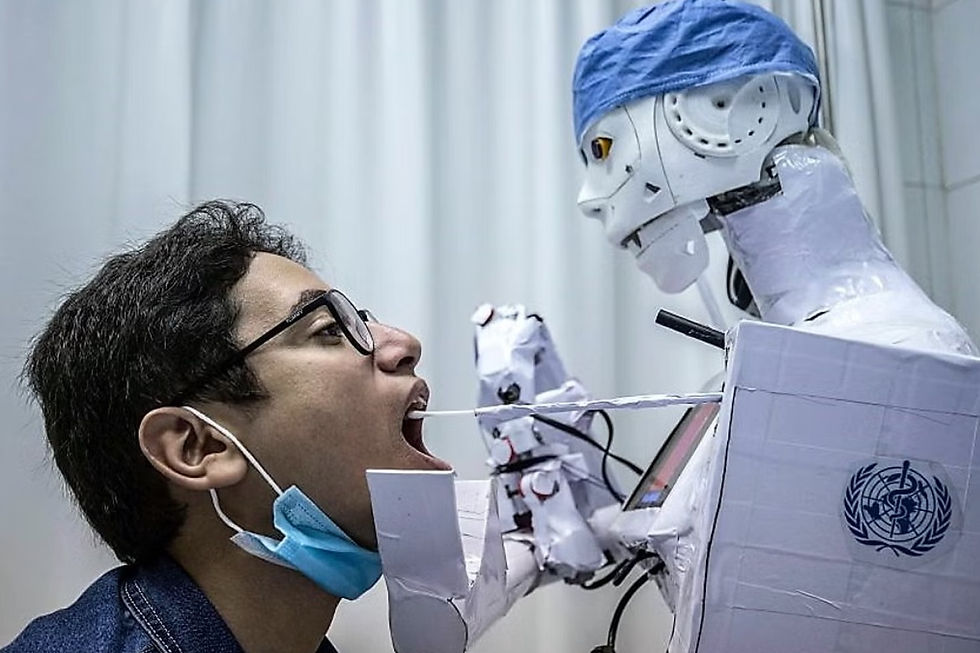The Struggle Between AI and Diagnostic Methods in Healthcare
- Mohammed Oudah - MM (GHRGHAR GROUP)

- Nov 19, 2024
- 2 min read

Artificial intelligence (AI) is experiencing rapid and surprising growth in the medical field, particularly in diagnostic tools. Research and studies have advanced to significantly contribute to healthcare by offering greater accuracy and speed in detecting diseases. AI plays a crucial role in early disease detection, streamlining workflows, and assisting in data interpretation to determine the most suitable treatments. However, the question remains: can AI be fully relied upon for precise, error-free diagnoses?
At this stage, it is important to distinguish between available AI applications that may help identify health issues and advanced medical technologies that rely on AI to assist doctors in diagnosis. AI has evolved to play an essential role in medical care and disease diagnosis, raising concerns about its overuse and unregulated deployment in the field, especially given the potential risks to patient safety. Do AI-based technologies meet the accuracy standards necessary to prevent errors that could endanger patient health?
Doctors are well aware of AI's expanding role, particularly in diagnosing diseases related to the digestive system and intestines. One such technology is endoscopy, which utilizes AI to detect diseases with greater precision. Dr. César Yaghi, a specialist in liver and digestive diseases at Hôtel-Dieu de France Hospital, explains that AI-enhanced endoscopies can accurately detect polyps (infections) that may develop into cancer. Over time, doctors gain experience in identifying polyps that might turn cancerous based on their appearance, but with AI, detection is even more precise, enabling earlier intervention to remove potential carcinogenic growths.
Dr. Yaghi adds that the rapid advancement of diagnostic tools, powered by AI, allows for faster and more accurate identification of such polyps compared to traditional methods. While AI technologies significantly enhance a doctor's ability to conduct thorough and timely assessments, human expertise remains essential. AI serves as a valuable tool for speeding up diagnoses, but it cannot replace the physician's judgment and role in treatment decisions.
The expert emphasizes that while AI is evolving quickly, a doctor's presence is still necessary. AI is meant to assist, not replace, medical professionals. In cases where AI's recommendations diverge from a doctor's assessment, the doctor's opinion remains the final authority. This principle also applies to radiology, where AI might detect issues in imaging, but ultimately, it is the physician who interprets and decides the course of action.
Dr. Yaghi also cautions against underestimating the reliance on unscientific applications in AI-based health tools. He distinguishes between evidence-based medicine and alternative, unproven methods often marketed through AI-driven diagnostic apps. These apps often use algorithms that generate over 100 potential diagnoses based on user-reported symptoms. In contrast, doctors rely on clinical exams, patient interviews, and various tests (such as endoscopies and X-rays) to make accurate, individualized diagnoses. Although AI-based apps may raise awareness of potential health risks, they cannot replace the physician’s comprehensive clinical examination. They are not yet accurate enough to be relied upon for definitive diagnoses.
In conclusion, while AI is a valuable tool that aids healthcare professionals, it should not be seen as a replacement for the nuanced and informed decision-making of trained doctors. Its role is supportive, enhancing speed and precision, but medical expertise remains essential in ensuring patient safety and accurate diagnosis.



Comments